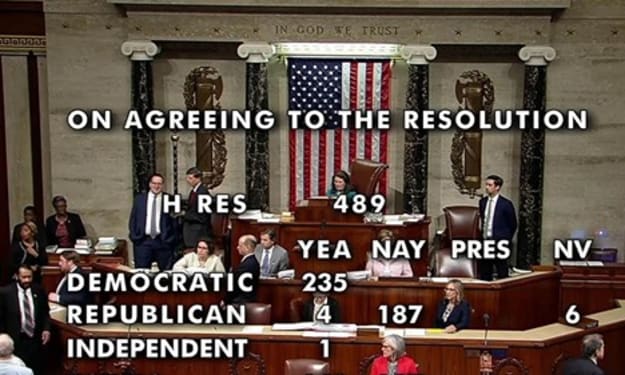legislation
The bills that Congress reject are as informative as the ones it does. Reviews of all the legislation that meet their fate in government halls.


"Everything Has Gone up": Democratic Lawmaker Argues $15 Federal Minimum Wage Too Low
The US House of Representatives recently voted to approve a hike in the national minimum wage to $15 per hour over the next several years. For at least one freshman lawmaker, however, that increase is insufficient.
Chris AgeePublished 5 years ago in The Swamp

Bryan Watch: July 15-18
Let’s start out with the obvious vote of the week: Rep. Green’s attempt to impeach President Trump, which was tabled on a vote of 332 to 95. While a short term loss, there were some key votes in favor. Critically, the members of the House Judiciary Committee voted 16 to 8 against tabling. Whether this was because they wanted the issue in their committee or they genuinely felt Trump merited impeachment, it indicates there is a consensus on Judiciary that impeachment hearings are warranted. Key “No” votes include Chairman Jerrold Nadler and Vice Chair Marcia Scanlon.
John HeckenlivelyPublished 5 years ago in The Swamp

Bryan Watch: NDAA July 12
This is an update on what congress did on Friday, July 12, which was primarily work on the National Defense Authorization Act.
John HeckenlivelyPublished 5 years ago in The Swamp

Bryan Watch: July 9-11
Big week for Representative Steil as his first bill passed the House of Representatives. It was HR 3050, the Expanding Investment in Small Businesses Act. The purpose of the bill is to require the Securities and Exchange Commission to carry out a study of the 10 per centum threshold limitation applicable to the definition of a diversified company under the Investment Company Act of 1940. (RC 432, July 9)
John HeckenlivelyPublished 5 years ago in The Swamp

Reason First: Should Racism Be the Norm?
The government should not be involved in anything that doesn’t involve protecting individual rights. For instance, if a music festival such as AfroFuture Fest wishes to overcharge whites or “non-POCs” or “non people of color,” the state should recognize their right to discriminate. Now, with that being said, whites, people of color, and anyone else with a rational brain in their skull should repudiate the festival and deny monetary support for the organization. The clearly racist act even brought out white supremacists which made this a clusterf–– of irrationalism. AfroFuture’s stupidity in trying to charge white people more than other races should be protected by the government. If they want to be idiotic and boost the price for people lacking a certain concentration of melanin, that’s their business. They should be free to be as bigoted as ever without any worry of force being imposed against them. The group extended that price break to “Black and Brown people.” But what about red, yellow, and yes, white people? Shouldn’t the color green be the ruling hue in this whole mess? Artist Tiny Jag, a person of color, denounced AfroFuture for their dim-witted actions. She took to Twitter to voice her disdain for the vicious ideas that AfroFuture has espoused. The young artist clearly said that she will not be playing the event and that their actions, “don’t reflect the views of the Tiny Jag Team.”
Skyler SaundersPublished 5 years ago in The Swamp

The 26th Amendment
I got to vote at 18, I remember that I took this very seriously. I couldn’t drive yet because of my family, but I decided to vote. I felt powerful, and I think I voted for Clinton that year again, despite all of his crazy scandals. The 26th Amendment is all about the right of 18 year olds to vote in any election. The United States is bound to not be able to deny the right to vote. The 26th Amendment is the last of its kind in a series of amendments enacted in more than one century. This amendment is designed as protection for voting rights.
Iria Vasquez-PaezPublished 5 years ago in The Swamp

Bryan Watch: Labor HHS Part 2
On Tuesday and Wednesday, the House went through another 40 amendments to the Labor-HHS Appropriations Bill (HR 2740). Of those votes 31 were party line and 11 were non party line.
John HeckenlivelyPublished 5 years ago in The Swamp

The 25th Amendment
The 25th Amendment delves into what is to be done if a sitting President dies while in office. The Amendment takes into account what happens to a President if necessary, whether found in the circumstances of death, removal, resignation, or incapacitation. The removal of a President or Vice President from office requires the application of these procedures. The 25th Amendment was already organized in the aftermath of the assassination of President John F. Kennedy, an act that shocked the free world, leaving huge emotional scars for those who were around during this time.
Iria Vasquez-PaezPublished 5 years ago in The Swamp

Jury Nullification
Jury nullification is an important concept in the United States, and one that prosecutors really don’t like. It has the capacity to allow individual citizens to exercise independent judgment about the criminal law and the guilt or lack of guilt of any criminal defendant, which is why prosecutors really don’t like it.
William TurnerPublished 5 years ago in The Swamp

Statutes of Limitations: Is It Too Late to Sue?
Whether you watch lots of crime shows on television, or just have a basic understanding of law, you’ve likely come across the phrase “statute of limitations.” While this phrase may sound a bit daunting to the uninitiated, it is actually a relatively straightforward concept once you begin to break it down. If you’re about to enter into legal proceedings (or think you may have reason to), it’s important to fully understand what a statute of limitations is, and how it applies to your case:
Claire PetersPublished 5 years ago in The Swamp

The 23rd Amendment
The 23rd Amendment to the Constitution was passed on June 16th, 1960 and had to do with electors, as well as the right to the people living in the District of Columbia the right to vote in Presidential elections. The 23rd Amendment was ratified on March 29th, 1961. This Amendment refers to the fact that the Constitution provides each state with presidential electors that are equal to the number of seats that are put together in the Senate and House of Representatives, since the District of Columbia is not a State, which means it didn’t have electors prior to the adoption of the 23rd Amendment.
Iria Vasquez-PaezPublished 5 years ago in The Swamp

The 20th Amendment
The President and the Vice President’s term is over at noon on January 20th, while the term limits of Senators and the House of Representatives end on the 3rd day of January. Congress needs to assemble once a year, while that meeting begins at noon on the 3rd day of January, unless the law sets up a different day.
Iria Vasquez-PaezPublished 5 years ago in The Swamp

















